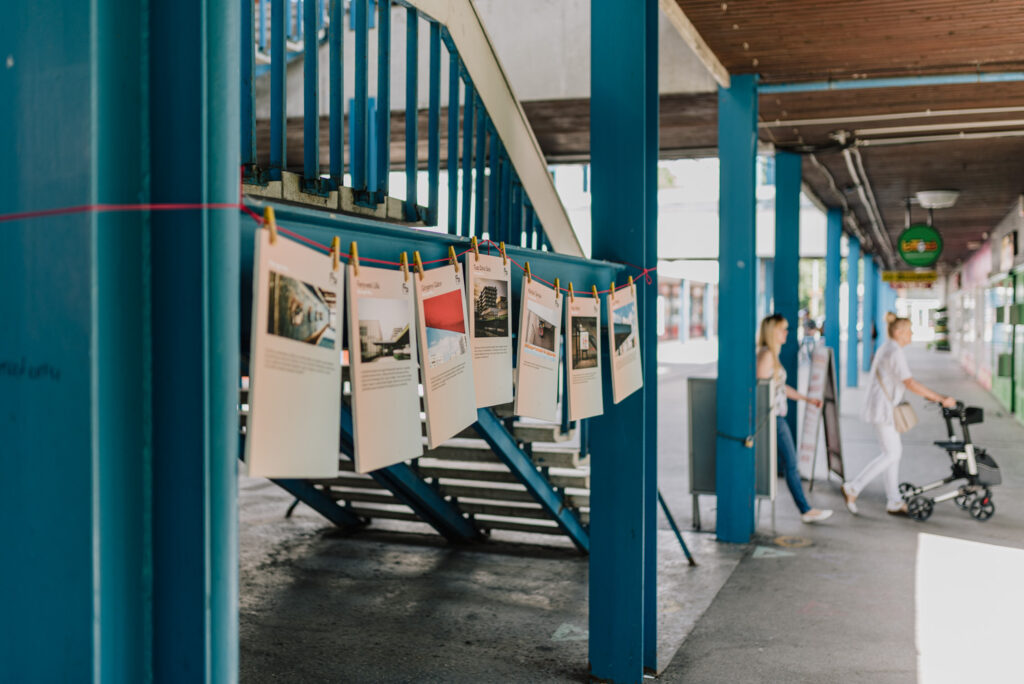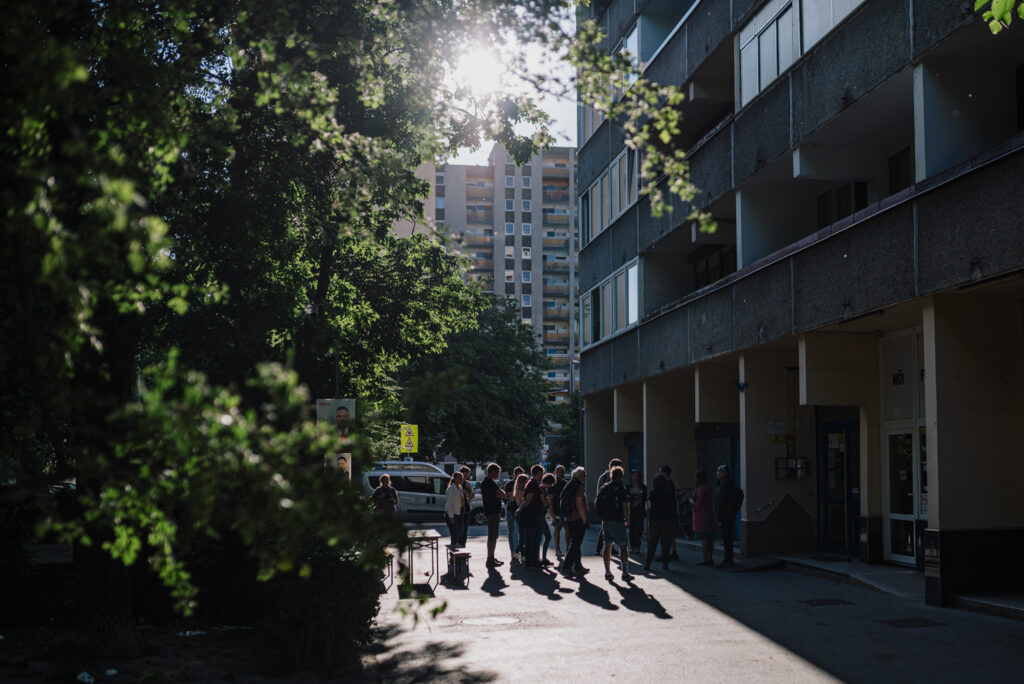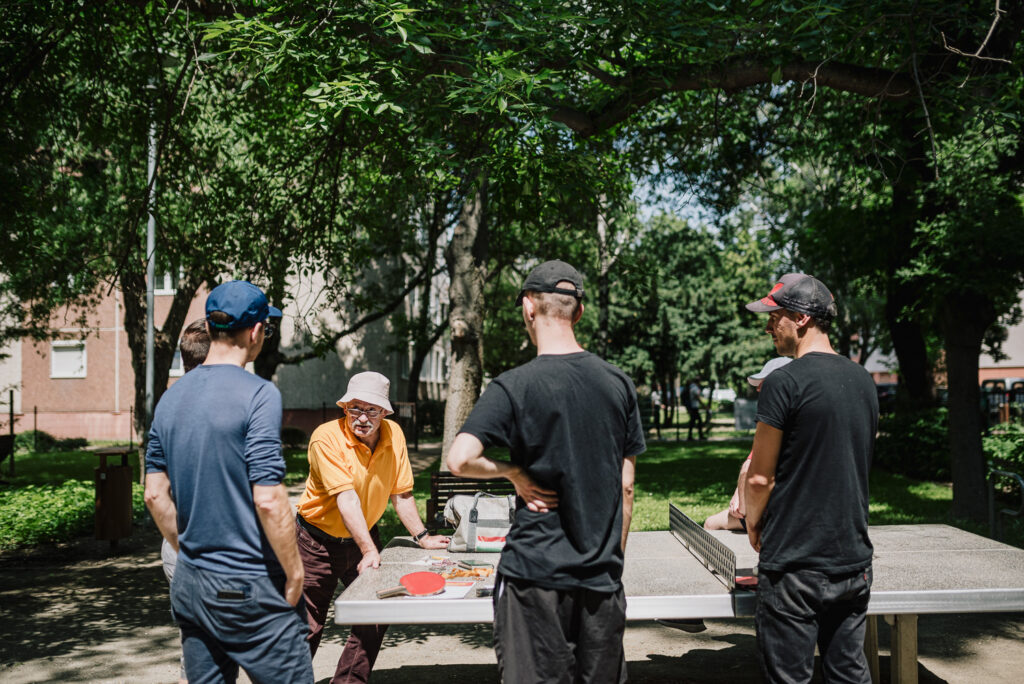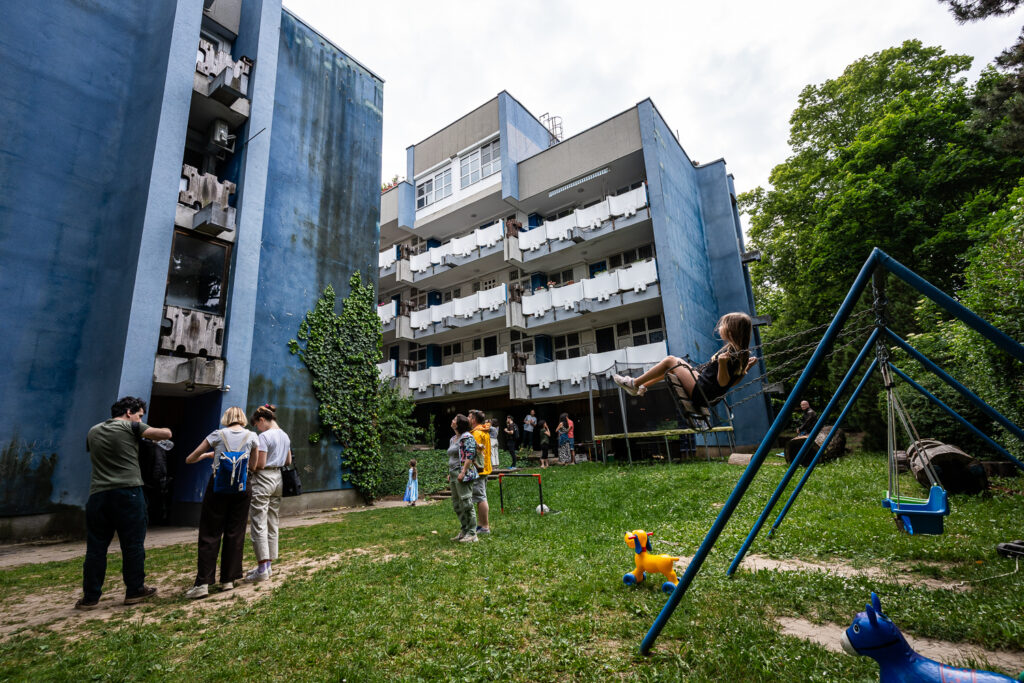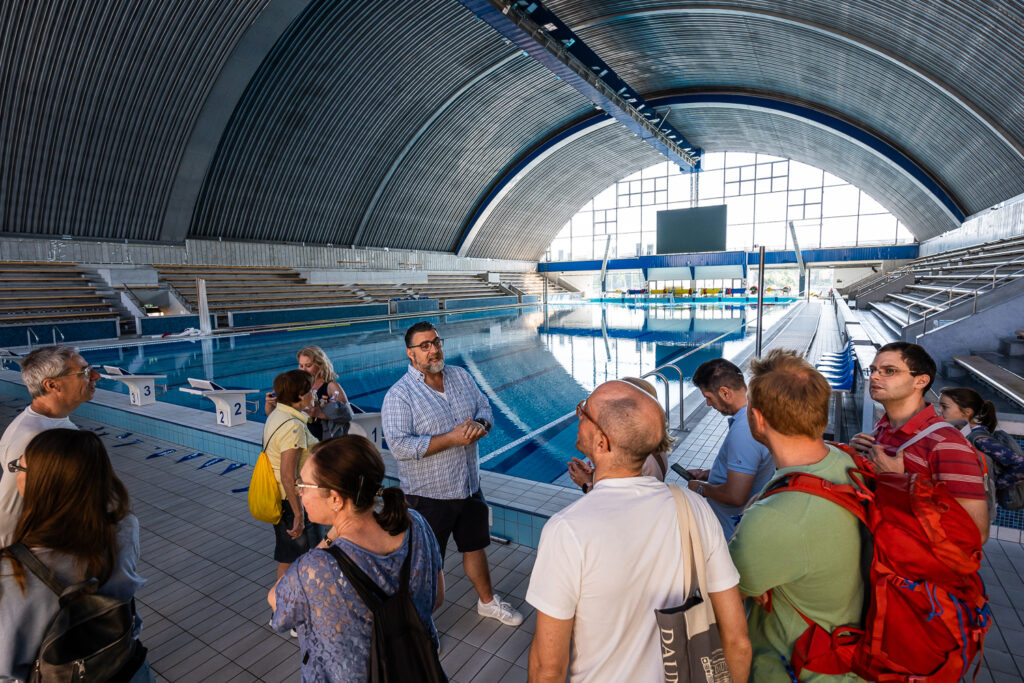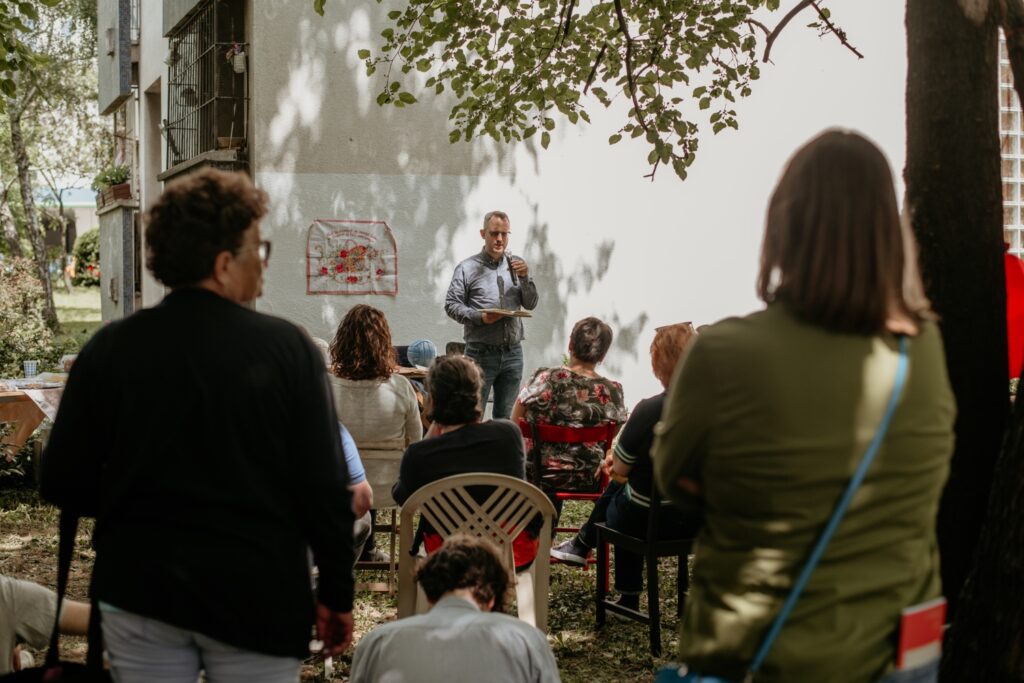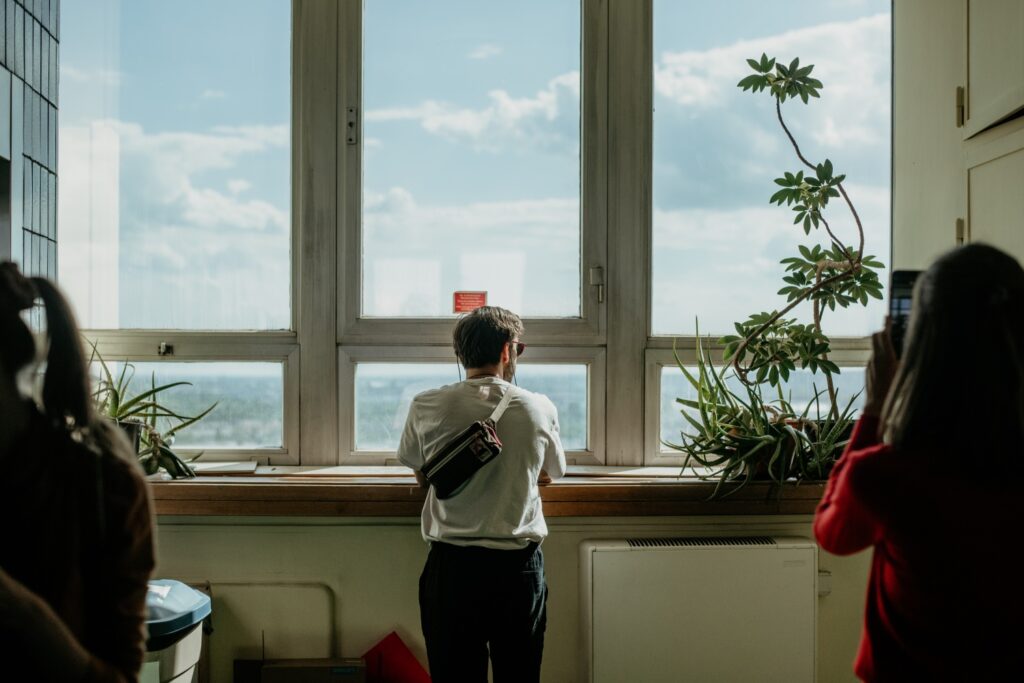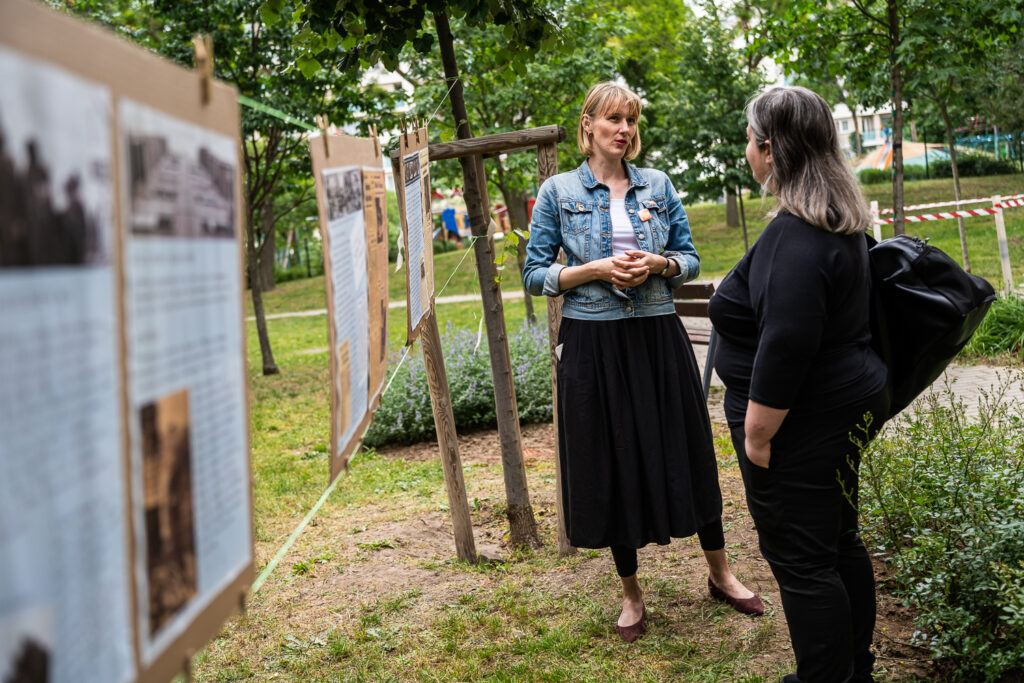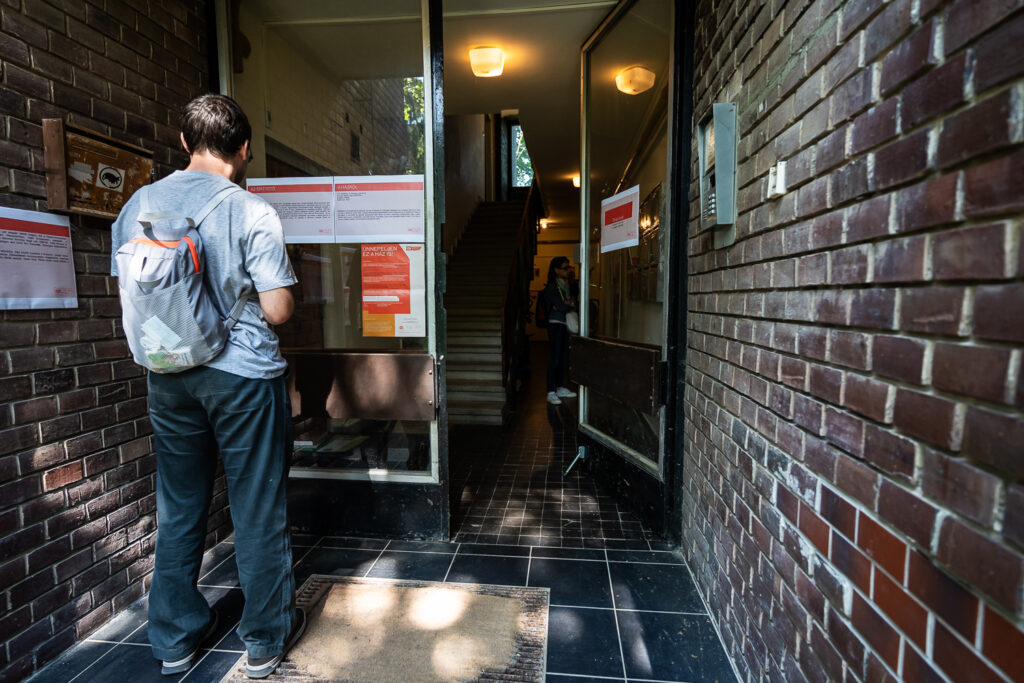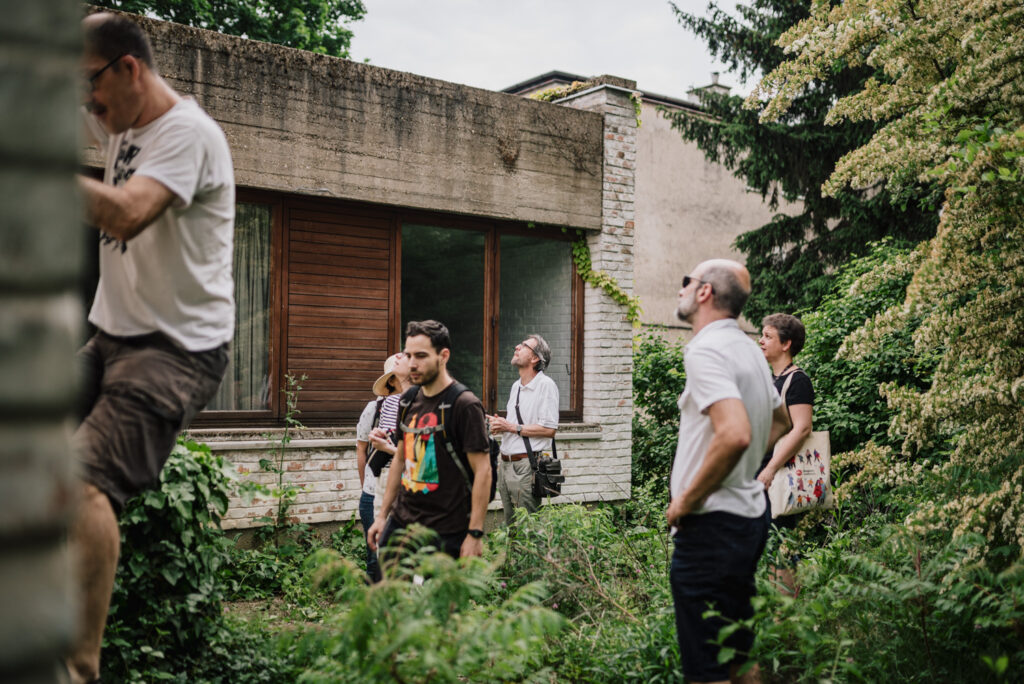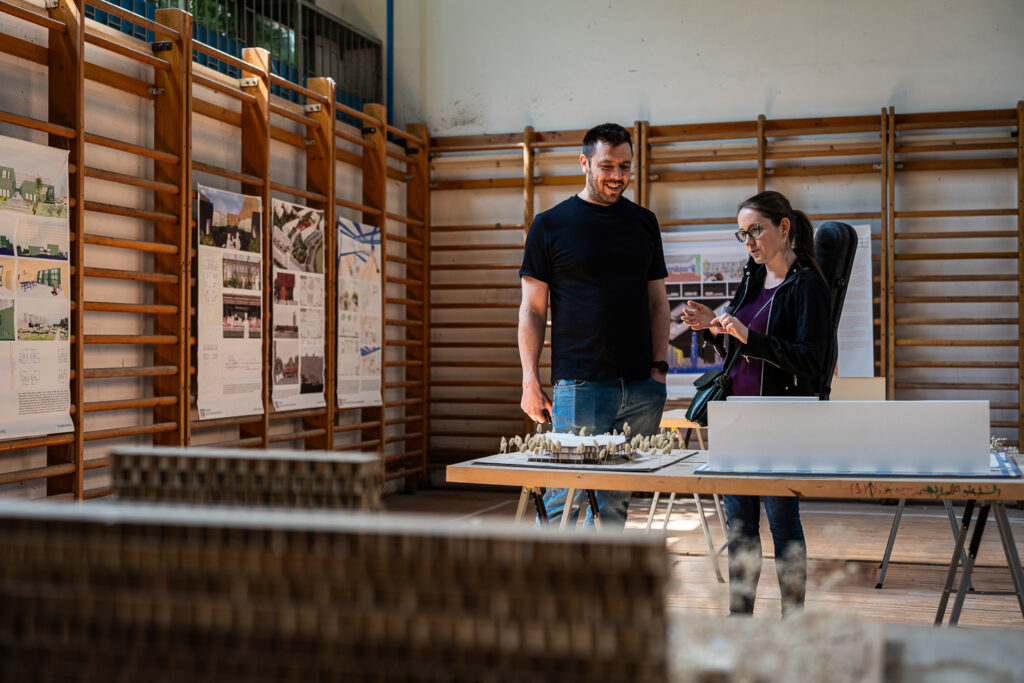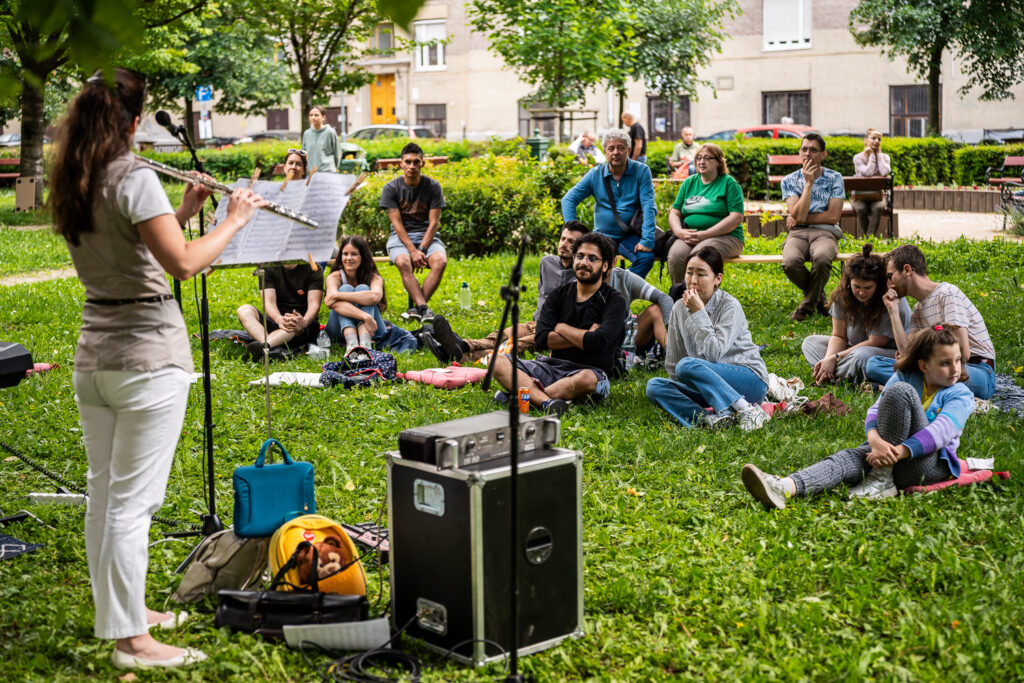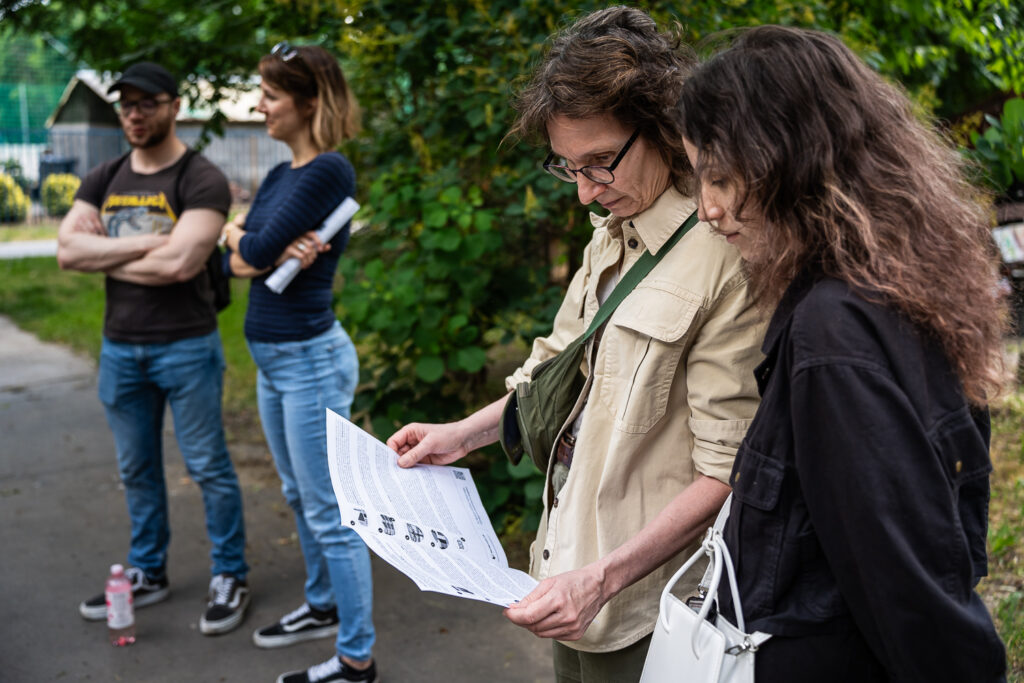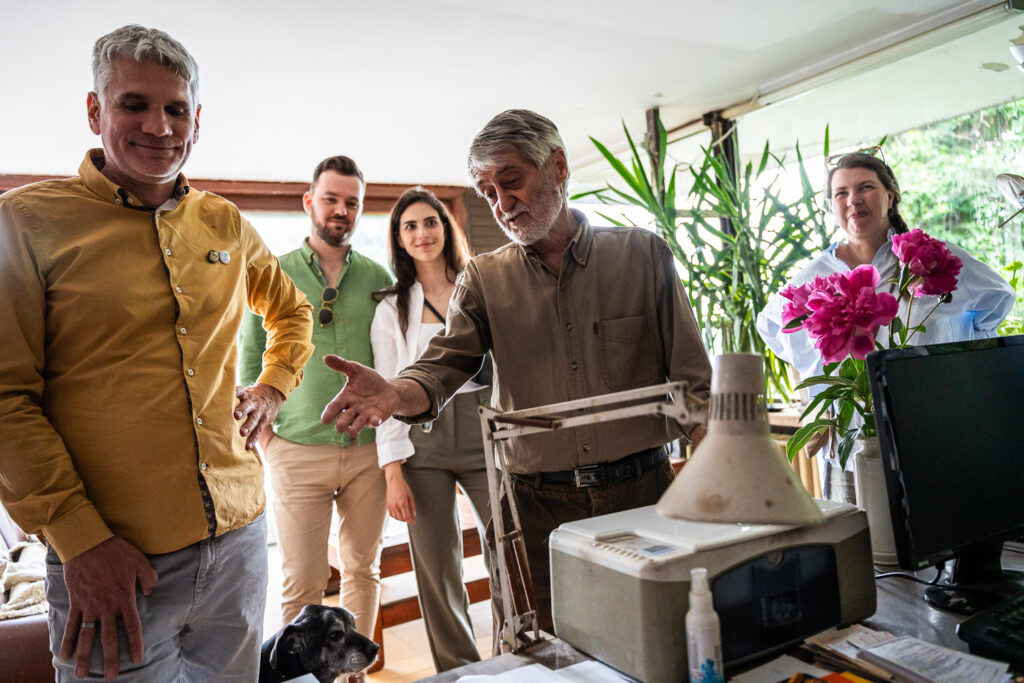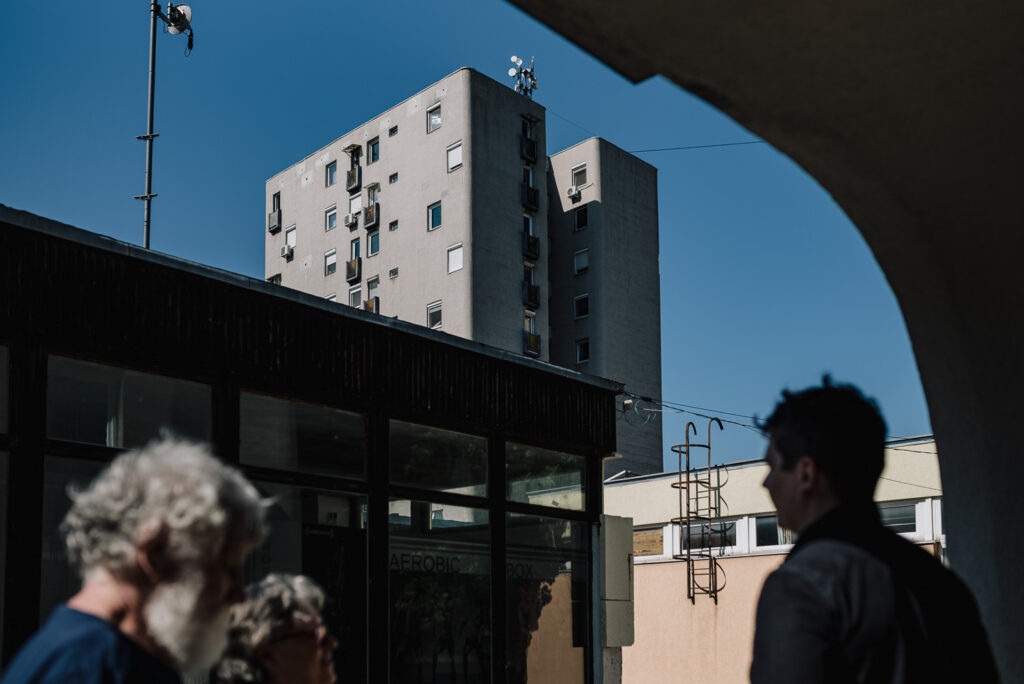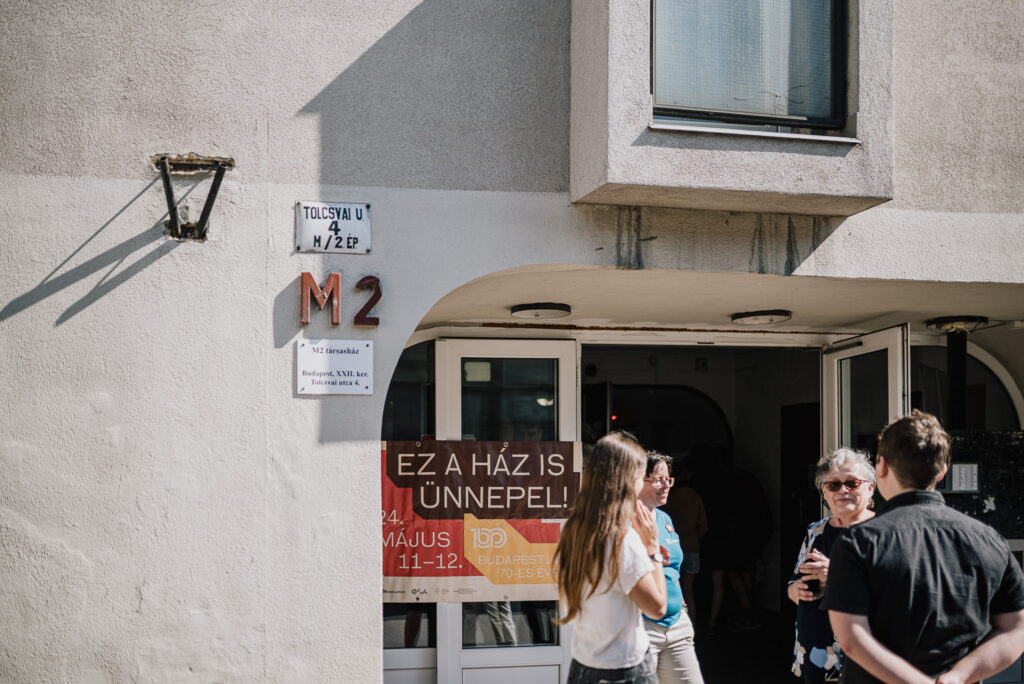’70s
Budapest100 2024
The 14th edition of Budapest100 presented the late modern architecture of Budapest in order to facilitate a discussion about the future of this endangered heritage. The buildings from this period have many interesting stories to tell – Budapest architecture lovers had a chance to immerse themselves in this controversial slice of the past during the Weekend of Open Houses and the Urbans Walks Day. It was also an opportunity to discover how houses, streets and even entire neighbourhoods have changed and how their fate has evolved along with the communities that lived in them then and now.
By choosing this topic, we wanted to start a dialogue about the architecture of a decade, and even a whole era, about which little information is available due to the lack of research. In the absence of knowledge, many buildings of great architectural and heritage value are at risk of demolition or renovation that completely obscures their original character. Because of their historical context, there is often a negative public perception of buildings from the socialist period, but at international level there is a growing number of projects dealing with the values and legacy of late modern architecture in the Central European region, as well as a number of initiatives exploring the links between East and West. We joined in these efforts with this year’s programme, which was also one of the highlights of the “Modern Season” of the program’s organizer, the Hungarian Contemporary Architecture Centre (KÉK). This year, for the first time, we had the opportunity to meet the architects and the first residents who moved into these buildings, and to see how concepts have been implemented and how neighbourhoods and districts have changed and been renewed over the last fifty years. From the outset, we were sure that these often drab, unwelcoming-looking houses could be brought closer to the people through the means we had already succesfully used before, namely personal stories. The Professionals’ Day on Thursday preceding the Weekend of Open Houses, which has been part of the Budapest100 program since 2022, was guided by the same idea: on 9 May, we conducted 45-50 minute, quick interviews with twelve architects from the 1970s at the Contemporary Architecture Centre’s office on Bartók Béla Road. The interviews were
published, and we held a book launch on 29 August 2024 in the OKISZ headquarters, an iconic office building from the ’70s, combined with a PechaKucha Night. The presentations can be re-watched on KÉK’s youtube channel. A limited edition of the publication is available at the KÉK’s office, and in pdf format on the KÉK “Tudástár” website. We also plan to publish the talks as podcasts. Friday’s Urban Walks Day was organised in collaboration with the KÉK Urban Walks team, and the houses covered by the walks were also uploaded to the freshly established ModernTéka database. In total, 11 thematic walking tours were held by invited experts, all of whom have been connected to late modern built heritage for some time. In total, 39 houses opened for the weekend, including many unique apartment houses, a church, an observatory, a swimming pool, a funeral chapel, a few office buildings, and, of course, housing estates reflecting the industrialisation of the period. The 292 programs included more than 30 urban walks, led by our volunteers. The positive feedback from volunteers and visitors alike was that the program had achieved its aim and, even if “only” for a weekend, thousands of people were able to discover the late modern buildings of Budapest, once again testifying to the motto of Budapest100, “Every house is interesting”.
Event booklet
Our partners
Opening houses
- Albertfalvai házgyári lakótelep
- Allende park
- Almássy tér 6.
- Álom utca 16-18.
- Alsóhegy utca 4.
- Árnyas út 15.
- Árpád fejedelem útja 7.
- Árpád fejedelem útja 8.
- Babér utca – Madarász Viktor utca – Kárász utca – Bárka utca – Gyöngyösi utca
- Bánkút utca 49-53.
- Bartók Béla út 48.
- Bartók Béla úti lakótelep
- Bég utca 3-5.
- Békásmegyeri lakótelep I. ütem
- Bertalan Lajos utca 4-6.
- Bogdánfy Ödön utca 10/a
- Budafoki kísérleti lakótelep – Experimental housing estate in Budafok [Tolcsvai utca 4.]
- Budaörsi út 45.
- Buzogány utca 10-12.
- Centenáriumi lakótelep I. üteme
- Csalogány utca 13-19.
- Csalogány utca 30-32.
- Csalogány utca 9-11.
- Csángó utcai telep
- Csepel-Belváros és Csepel-Szabótelep panelházai
- Egészségház utca – Földműves utca – Akácvirág utca – Ferihegyi út
- Előd utca 1.
- Etele út 63-65-67-69-71-73.
- Faludi utca 4-6/a-b
- Fehérvári úti lakótelep [Rátz László utca 76-86.]
- Fillér utca 78-82.
- Flórián tér 6-9.
- Fő utca 38.
- Fő utca 44-50.
- Füredi utcai lakótelep – Residential complex on Füredi street [Füredi utca 9/b]
- Ganz utca 13-15.
- Gellérthegy utca 20-22.
- Gizella út 37.
- Gvadányi utca 69.
- Gyorskocsi utca 5-7.
- Hadak útja 2-4-6.
- Hajós utca 11.
- Hankóczy Jenő utca 30-32.
- Hárshegyi út 5-7.
- Hegyalja út 139.
- Hess András tér 1-2. [Hilton Budapest]
- Irinyi József utca 42.
- Istvánmezei út 3-5.
- Izzó-lakótelep I. ütem
- Jókai Mór utcai lakótelep
- Jókai tér 9.
- Kacsa utca 14-18.
- Katona József utca 2/c
- Kispest-Városközpont I. ütem
- Kiss János altábornagy utca 29.
- Kmety György utca 26-28.
- Kőrösi Csoma Sándor út 1-27.
- Köves út 1.
- Krisztina körút 37/a [Déli pályaudvar]
- Kruspér utca 2-4.
- Kútvölgyi út 2.
- Kútvölgyi út 24/b-c
- Laborc utca 1-3.
- Laborc utca 2/c [Polaris Csillagvizsgáló]
- Lavotta utcai lakótelep sávházai
- Leányka utcai lakótelep
- Lévay utca 8.
- Lónyay utca 44.
- Losonci tér [Baross utca 91-119.]
- Losonci tér [Práter utca 56.]
- Margitsziget, Thermal Hotel
- Mészáros utca 48.
- Mézeskalács téri lakótelep
- Mogyoródi út 59-63.
- Molnár Ferenc tér
- Nagyvárad tér 4.
- Németvölgyi út 99.
- Nyárs utca 2-4.
- Nyírpalota út 52.
- Nyugati tér 1.
- Október huszonharmadika utca 18.
- Ond vezér park 5.
- Orlay utca 6.
- Őrmezői lakótelep
- Örs vezér tere 24.
- Pesterzsébet-Városközpont
- Péter Pál utca 17-19.
- Rákos út 94–106.
- Rátz László utca 3-7.
- Residential complex in Óbuda [Kiskorona utca 2-14.]
- Rippl-Rónai utca 29.
- Róbert Károly körút 67.
- San Marco utca 81.
- Stefánia út 34-36.
- Szabó Ervin tér 2. [BKK Futár Központ]
- Szent György tér 2.
- Szent István tér 7-11.
- Szent László tér 7-14.
- Szent Lőrinc-lakótelep
- Szirtes út 26-28-30.
- Szőlő utca 66-94.
- Szüret utca 2.
- Tamara utca 6.
- Táncsics Mihály utca 104.
- Tárnok utca 13.
- Tárnok utca 7.
- Tárnok utca 9-11. [Budavári Általános Iskola]
- Tétényi út 63.
- Thököly út 48-54.
- Thököly út 58-60.
- TIT Planetárium
- Tüzér utca 56-58. [Prevenciós Központ]
- Újhegyi lakótelep
- Újlipótvárosi lakótelep II/A ütem
- Újpalotai lakótelep – Újpalota housing estate [Kavicsos köz 2-4.]
- Újpalotai lakótelep – Újpalota housing estate [Nyírpalota út 1.]
- Újpalotai lakótelep [Nyírpalota út 71. Víztoronyház] – Újpalota housing estate [Nyírpalota út 71. Watertower House]
- Újpesti lakótelep I. ütem
- Váci út 71.
- Váci út 73.
- Váli utca 6.
- Varázs utca 18-20.
- Városligeti fasor 35/b
- Városligeti fasor 37.
- Városmajor utca 7-9.
- Vazul utca 12/a
- Vazul utca 12/b
- Vezseny utca 2/a-b
- Vezseny utca 4-6/a-b-c
- Vezseny utca 8.
- Villányi út 11-13.
- Víztározó köz
- Völgy utca 3.
- Vörösvári út 110.
- Wesselényi utca 29-33.
Volunteers
- Andrási László
- Arutiunian Arina
- B29 Ifjúsági Közösségi Tér
- BME Vásárhelyi Pál Kollégium tanárai és kollégiumi körei
- Balaton Anna Lolita
- Balázs Borbála
- Bardi-Kovács Andrea
- Barta Ágnes
- Beer Zsófi
- Bihari Kati
- Bohus Zsófia
- Bojti Gizella
- Bojár Iván András
- Bordás Péter
- Borók Imre
- Branczik Márta
- Braun Éva
- Budapesti Közművek Nonprofit Zrt. BTI Temetkezési Divízió
- Bácskay Andrea
- Bálint Andrea
- Bálint Janka
- Bálint Lilla
- Bálint Péter
- Bánki László
- Bánlakyné Moravetz Edit
- Béres-Deák Krisztina
- Csattos Róbert
- Csatáry Orsolya
- Csizik Balázs
- Csonka János
- Czebe Nikolett
- Cziegler Mária
- Danyi Balázs
- Dobosi Mária
- Dobrányi Ákos
- Dombovári Márton
- Dombrovszky Zsófia
- Dr. Láng Orsolya
- Dr. Mező Ferenc Általános Iskola pedagógusai
- Dr. Máthé Csilla
- Dragon Tamás
- Dragon Zoltán
- ELTE BTK Kulturális örökség tanulmányok MA hallgatói
- Ecseki Judit
- Esze Tamás
- F. Dóczi Erika
- Farkas Pálma
- Fekete Dorottya
- Fekete Veronika
- Fonyódi Anita
- Friedmann Lajosné Ani
- Fullár Zoltán
- Fáczán Eszter
- GYIÖT Gyermek- és Ifjúsági Önkormányzati Társaság
- Gallai Ferencné
- Gasparikné Jóna Katalin
- Gaál Balázs
- Gittinger Tibor
- Gombár Erzsébet
- Grócz Árpád
- Gugi Anna
- Gugyella János
- Gurdon Balázs
- Gyalogh Boglárka
- Gyetvay Gabriella
- Gyárfás Noémi
- Gyöngyösi Péter
- Gyönki Viktória
- Göllner Pál
- Halmos Judit
- Harmath-Gyetvay Enikő
- Hegedüs Bettina
- Holup Marcell
- Hortobágyi Péter
- Horváth Edina
- Horváth Péter
- Illés Zsombor
- Jakobetz László
- Juhász Emese
- Kapcsos Bence
- Katona Márk
- Kecseti Lídia
- Kollár Róbert
- Kolumbán Zsuzsi
- Kondora Dóra
- Kordos Szabolcs
- Kormos Mercedes
- Kovács Krisztina
- Kovács Tamás
- Kristóf Boglárka
- Kulcsár Géza
- Kállai Júlia
- Kévés Kata
- Kövér Nóra
- Kőnig Tamás
- Labros Labrousis
- Lencsés Albert
- Ligeti Anna
- László Zoltán
- Lévai Dorottya
- Lévai Lívia
- MOME Építészeti Intézet
- Maczó Balázs
- Major Kata
- Maklári-Klekner Mariann
- Makuna Jalaghonia
- Martina Fanni
- Maróthi-Krett Andrea
- Matt Dreher
- Merker Iván
- Milák Szilvi
- Miskolczi Péter
- Mogyorósy Marietta
- Molnár Bianka
- Molnár Zsófia Helka
- Nagy Ildikó
- Nyári Attila
- Nádosi Márta
- Németh Borbála
- Pap Gergely
- Polgár Ádám
- Popp Judit
- Pál Rebeka
- Pálfi Csilla
- Pálinkás Beáta
- Pápai Andrea
- Péterfi Anna
- Péterfi Ferenc
- Ravasz Ildikó
- Refle-Tatár Barbara
- Ringhofer Ervin
- Révész Mária
- Salamon Tímea
- Schneider-Bánfalvi Tamás
- Sedró Péter
- Somody Zoltán
- Stummerné Szurok Noémi
- Suki András
- Surányi Imola
- Szabó Annamária
- Szeift Igor
- Szepesvári Petra
- Szilágyi Anna
- Szlabey Luca
- Szolnok Ádám
- Szádvári Lídia
- Száraz Anna Márta
- Sándor Natália
- Séra Natália
- Sóki Diána
- Teket Ádám Gábor
- Thomas Szczepaniak
- Torma Tamás
- Turai Katalin Ráhel
- Tóth Dóra
- Tóth Mária
- Török Renáta
- Vadász Attila
- Vadász Ágnes
- Valasinyovszki Lilla
- Varga Kinga
- Veress Kinga
- Virág-Nagy Dia
- Virányi Anna
- Vo Son Nam
- Vogel Gábor
- Várhegyi András
- Wetzl Márta
- Zoltán Áron
- Zubreczki Dávid
- Ábrahám Krisztina
- Építésügyi Dokumentációs és Információs Központ munkatársai

